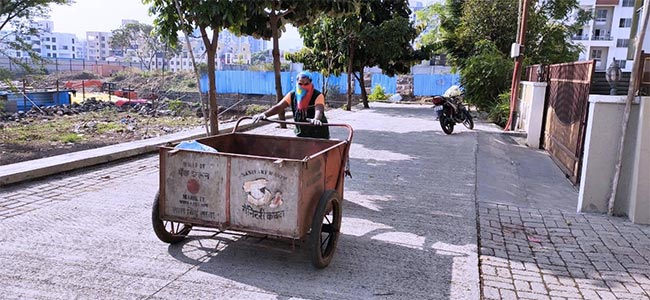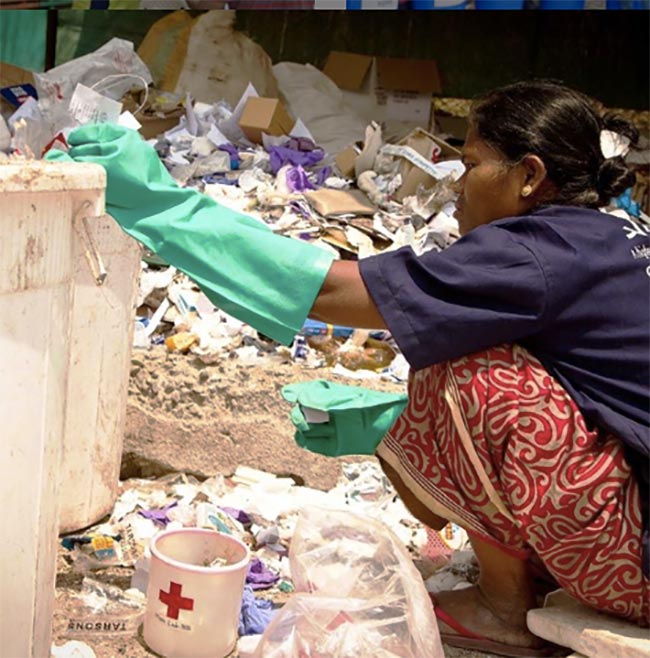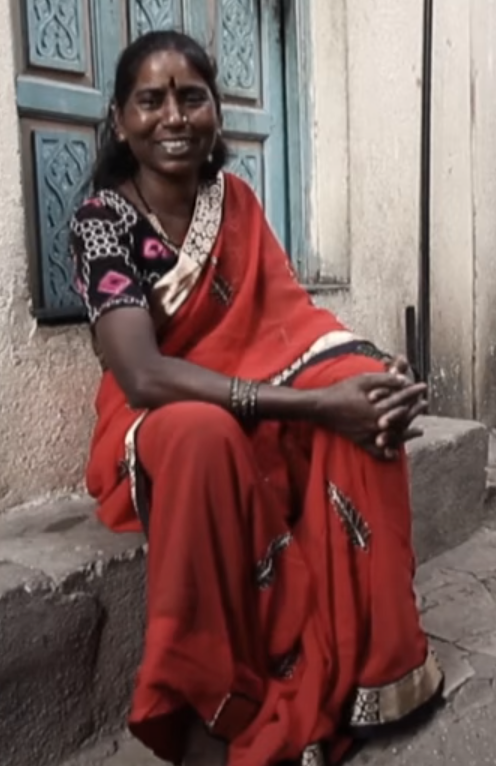Highlights
- The Red Dot campaign was launched in February 2018
- Sanitary waste disposal is a huge problem in the country: SWaCH
- Menstrual Hygiene Day aims to promote good menstrual hygiene management
New Delhi: With an aim to raise awareness among people about the importance of menstrual waste management and protect the waste collectors from health problems caused by handling erratically disposed of sanitary pads, the sanitation workers associated with SWaCH, have urged people to segregate menstrual waste at home and put a red dot on the waste bag. SWaCH or the Solid Waste Collection and Handling Cooperative Society was established in 2007 to provide better sources of income to waste pickers by incorporating waste pickers into the formal set-up and promote the habit of waste segregation among the people of Pune city. On the occasion of Menstrual Hygiene Day, which is observed on May 28 every year, members of SWaCH shared their concerns and experience of handling menstrual waste with NDTV.
According to Suchismita Pai, Head of Outreach and Communication programme of SWaCH, the member waste pickers handle about 20 thousand kilograms of sanitary pads and dirty diapers every day, exposing themselves to various kinds of micro-organisms like E.Coli, salmonella, staphylococcus and pathogens that are responsible for infections and life-threatening diseases like hepatitis, tetanus, and typhoid. She said,
If every menstruating woman starts segregating her waste by simply putting a red dot on her used sanitary waste, then the lives of several sanitation workers can be saved. The red dot will let the workers know that these packets are not to be opened. We started the Red Dot campaign in February 2018 with an aim to protect our members from being exposed to dangerous waste and bacteria from bodily fluids. Under this programme, we have trained SWaCH members on creating awareness about inculcating sanitary waste management techniques in households they go to collect waste. There is still a long way to go and the practice of safe disposal of sanitary napkins is yet to become a habit among many girls and women.
While talking about the Red Dot Campaign, Suman More, chairperson of SWaCH and former waste collector said that menstrual hygiene has to be a multi-pronged approach and not looked at in isolation as the responsibility of the woman having her period. She said that the Red Dot campaign is an effort to place the responsibility of hygienic disposal of sanitary waste on the producers of sanitary products with the consumers marking and identifying the waste by a Red Dot. She asserted,
How can there be hygiene when there is no proper way to dispose such products? As the chairperson of the board of SWaCH, and an avid proponent of Women empowerment, I would like to say that how can we have a menstrual hygiene day, if there is going to be silence about sanitary products and menstrual hygiene? Nobody wants to talk about the risks faced by sanitary workers while dealing with menstrual waste.
Another SWaCH member, Supriya Bhadakwad, a 38-year-old waste collector said that in slum areas, many girls and women try to hide from their family members that they are having their periods as they are still subjected to the prejudice of being considered impure while menstruating. Because of this, they dispose of the used sanitary products secretly in gutters, open dumps and bins. She expressed concern about this and said,
Such Practices just reflect the state of women’s health. If they are forced to dispose of their used products in such a manner, they must also be forced to go for long durations without changing the pads, do it only secretly, dry the cloth they use in dark, dingy, unseen spaces, and suppress any issues connected with menstruation and hygiene. It is little wonder that millions of girls drop out of schools due to lack of sanitation facilities. We want the Red Dot to be marked on all packets with used pads since our health is also impacted by the open and careless disposal of sanitary waste. Identifying it with a Red Dot will bring the conversations on women’s health to the fore and help improve the health of the society as a whole.
Sarru Waghmare, a 53-year-old waste collector who became a member of SWaCH in 2004 said that it still shocks her when she and her co-workers segregate menstrual waste by hand and deal with unboreable smell and insects every day. She said,
I have been diagnosed of bacterial infections multiple times. While I have become financially independent and gained respect after becoming a uniform-clad door-to-door waste collector but I do feel a loss of dignity every day when I deal with menstrual waste and soiled diapers. Things can become many times easier for us if people just wrap sanitary pads and diapers. By marking it we know not to open the package.
Ms. Waghmare highlighted that like her, many other workers also face health issues on a regular basis.
SWaCH Members Are Actively Contributing In Keeping The City Clean Even During COVID-19 Lockdown
According to Vidya Naiknavre, a 40-year-old waste collector with SWaCH, the organisation is collecting door-to-door waste from over eight lakh properties – both residential, commercial and slums, across Pune and the members have been on-duty even during the COVID-19 lockdown. She said,
I want to urge people to mark all sanitary waste especially in these times of COVID-19. The exposure to body fluids of patients can be extremely dangerous for us. We have been doing our part by being on duty every day and sometimes even going beyond by working for more hours than usual. You must do your part by keeping us from being exposed to viruses and bacteria.
57-year-old Anjana Ghorke was asked by the owners of the one-room house she lives in with her family of four, to either quit her work or shift somewhere else during the first COVID-19 lockdown. When faced with this tough option, Anjana Ghorke chose to move rather than quit. She shares,
How could I quit? I chose to continue working because of which I had to move. I understand the importance of the work I do especially in these times. There was no way to get anyone else to do this work temporarily as getting people to work in waste is not easy at best of times. Now everyone is afraid as we are highly vulnerable too as essential workers. We take all precautions but I can understand the fears of others. I will continue to work till the day I can.
Ms. Ghorke, who serves 350 homes in Hingne mala slum in Hadapsar, Pune walked out of that home, with just a few bare essentials as there was no way to transport her belongings, locking it behind her. She found a place closer to her work place and resumed her work, all without missing a single day at work. “There was no option and now I have to pay my rent in both places, but I am hoping this is just for a couple of months”, she said.
Also Read: Safe Mensuration A Basic Human Right Remains Elusive For Many Women Like Rajasthan’s Sabu Devi
The problem of Menstrual Waste in India
According to the Centre for Environment Education (CEE), established by the Government of India in 1984 to promote sustainable development, 1,230 crore soiled pads are generated every year. Out of this, 28 per cent is thrown along with other domestic waste, 26 per cent is dumped in open, 23 per cent get buried, 15 per cent is burnt in open and 8 per cent is thrown in toilets.
About Menstrual Hygiene Day
Menstrual Hygiene Day (MH Day) is a global advocacy platform that brings together the voices and actions of non-profits, government agencies, individuals, the private sector and the media to promote good menstrual hygiene management (MHM) for all women and girls. It was initiated by a German non-profit organisation called WASH United in 2013. MH Day targets to break the silence, raise awareness and change negative social norms surrounding MHM around the world. With the campaign ‘Its Time For Action’ MH Day aims to promote that every woman and girl has the right to access to the menstrual products of her choice.
Also Read: The All New Period Emoji Wants To Inspire Women And Girls To Talk Menstruation Freely


































